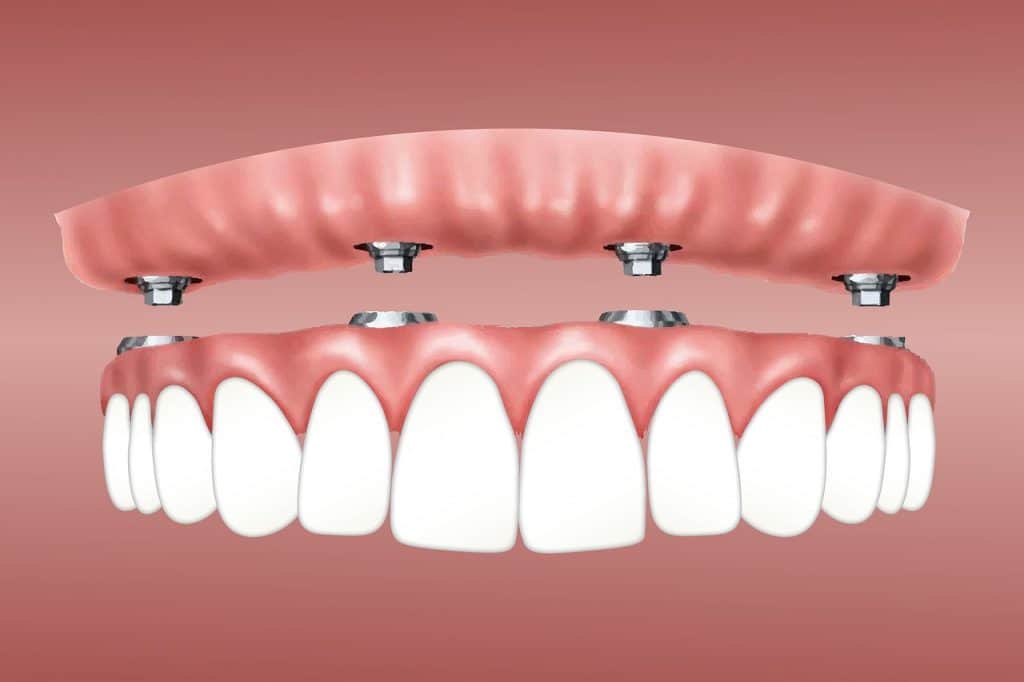Dentures have been used for a long time. Today, patients can get snap-in dentures, which are some of the most stable and reliable dentures available. The next evolution in the relationship between dental implants and dentures is implant-supported dentures. Natural dentures are removable and may eventually fall out. Regular dentures often necessitate the wearer to remove them each night and soaking them in cleaning fluid. Dentures that use implants are more stable than conventional dentures, giving patients a sense of stability.
What is a snap-in denture?
A snap-in denture is also called snap-on, implant-supported denture or implant-supported overdenture. An implant-supported denture is a form of denture that is supported by and fixed to implants. A traditional denture lies on the gums and is not reinforced by implants.
When is snap-in denture recommended?
When an individual has missing teeth but has enough bone in the jaw to accommodate implants, a snap-in denture is suggested. Special connectors on implant-supported denture snap onto attachments on the implants. Since normal dentures are less flexible in the lower jaw, snap-on dentures are typically used there. A normal denture designed to match an upper jaw is usually very secure on its own and does not require the extra support provided by implants. However, you can get a snap-on denture in either the upper or lower jaw.
What are the Types of Snap-in dentures?
Snap-on dentures are classified into two types: bar-retained and ball-retained. The denture will be constructed of an acrylic base that resembles gums in both cases. Porcelain or acrylic teeth are connected to the acrylic base and that appear like real teeth. Both forms of dentures necessitate the use of at least two implants for protection.
Bar-Retained Snap-on Denture: A thin metal bar traces the shape of the jawline and connects between two and five implants that we insert on the jawbone with bar-retained implant-supported dentures. The patient then snaps the prosthesis into place using the clips or other connections that are attached to the bar. These snap-on dentures attachments tightly hold the denture in position as it fits over the bar.
Ball-Retained Snap-on Dentures: Stud-attachment denture is another name for ball-retained dentures. Each implant in the jawbone contains a metal connection that fits into a denture connection. Most implant attachments are ball-shaped (“male” attachments) and fit into slots (“female” attachments) on the denture. In certain situations, the male attachments are held by the denture, while the female attachments are held by the implants.
What will be done during the initial consultation for snap-in dentures?
You need to schedule an appointment with an experienced Prosthodontist. A Prosthodontist will have special training in placing implants and constructing dentures. You can call us and schedule an appointment with Dr. Adatrow for an initial consultation.
For your initial consultation, your dentist can review your medical and dental history, take X-rays, and take impressions of your teeth and gums to create templates. In certain cases, a computed tomography(CT) scan of your mouth may be used to find the sinuses and nerves (located above your upper teeth). It enables the Dentist to ensure that the implant placement will not damage the sinuses or nerves. A CT scan will show the availability of the bone and where the implants should be placed.
If you do not already have a full denture for teeth replacement, your dentist will make a temporary denture for you, which has to be before the insertion of snap-on denture. This denture will require four visits over the course of several weeks to complete. Your dentist will decide the best place for the teeth in the final denture by creating this temporary denture. The temporary denture may also be used as a replacement if the final implant-supported denture is damaged. To save money, the temporary denture may also be used as the final denture. Attachments would be needed in order for it to fit securely to the implants.
Looking for best dental implant crowns in memphis?
Dr. Adatrow can help!
If you have any further questions about oral health, you can schedule a consultation with Dr. Adatrow. Dr. Adatrow has more than 18 years of experience in placing dental implants, with a success rate of over 97%, and can provide you with the best possible dental treatment. He is a Board-Certified Prosthodontist and Periodontist. Please contact our office to schedule your consultation now!

